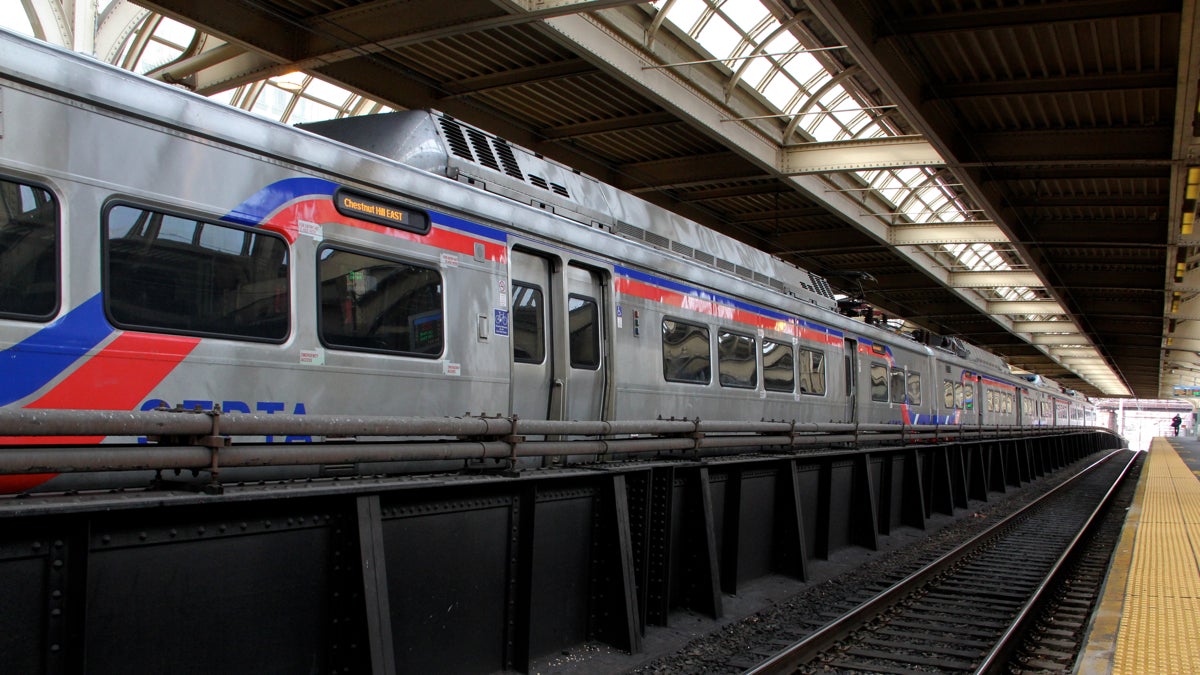SEPTA train crews seek federal intervention over work schedules
Listen
30th Street Station. (Emma Lee/WHYY)
Conductors and engineers for SEPTA’s regional rail lines have asked federal regulators to reinstate work rules designed to prevent driver fatigue, saying the agency’s new scheduling system has led to last-minute assignments that make it hard to get enough sleep.
“It’s scary, because you have so many things you have to be aware of when you’re running a train,” said Tracie Hand, a SEPTA engineer who said she’s “absolutely” driven trains while fatigued. “I want to get you to and from work safely, I want to get back to my family, and I want to have a job tomorrow. You have to think of all those things at once.”
Hand was one of several engineers and union officials who testified before Federal Railroad Administration officials Tuesday, arguing that the “waiver” that made SEPTA’s new system possible – a temporary exemption from federal workplace rules — should be revoked.
Stephen Bruno, treasurer for the national Brotherhood of Locomotive Engineers, called the new system a “failed experiment” that may be more efficient for SEPTA, but which could compromise the safety of workers and passengers alike.
“The [goal of the] experiment was to actually improve the amount of time that locomotive engineers had to prepare themselves to come to work rested,” Bruno said. “That has not improved. And, in some cases, it’s gotten worse, because the waiver can only make rest times shorter.”
SEPTA officials countered that the new system’s record is spotless so far, with no fatigue-related incidents to report after almost two years. They’d like the waiver from federal work rules made permanent.
“Every time there is an incident on the railroad, one of the first things we look at is hours-of-service records,” said Ronald Hopkins, SEPTA’s vice president for operations.
“We cannot point to any one incident where there has been a fatigue-related safety issue,” Hopkins said. “We feel we have a very good process in place to manage our day-to-day operation.”
But Hand and other engineers argued that the overall effect of the waiver has allowed SEPTA to give workers unpredictable shifts that can require long commutes. Hand described a recent day that left her pushing the envelope of her own endurance.
“I started work that morning at 4 a.m., and got off a little after noon,” she said. “I asked them if I would have to work another shift in eight hours, and they told me I wouldn’t have to … so I went out and enjoyed my day with my family.
“At 8:30 at night, they called me [to] tell me I’m on duty at 11 o’clock that night … to 7 a.m. I said to them, ‘Do you realize I’ve been up since 3 in the morning?'” Hand said.
Still, she worked the shift anyway; engineers who feel fatigued can turn down a shift they’re assigned, but if they do they’re given “points” that can eventually lead to disciplinary action. Points are also given, for example, to workers who show up late. “I don’t mind doing my job,” she said. “I just want to be safe while I do it.”
Hopkins said he sympathizes with workers like Hand; even under the best conditions, engineers routinely work six-day weeks of 60 hours or more.
But SEPTA remains convinced that the benefits of its new scheduling system outweigh the issues. “This only affects 25 percent of our engineers and conductors,” those listed on the so-called “extra board” who get called to fill in for others, Hopkins said.
Eliminating the new system would mean going back to a more ad-hoc and less efficient method of scheduling, he said.
But, he added, SEPTA is moving to add staff to reduce the stress on existing workers. “We’re aggressively hiring more engineers – because the more engineers we have, the fewer people we need on the extra board,” he said.
Federal regulators say they’ll be accepting written public testimony on the issue for the next month. A decision on the work rules is expected in the spring.
WHYY is your source for fact-based, in-depth journalism and information. As a nonprofit organization, we rely on financial support from readers like you. Please give today.




